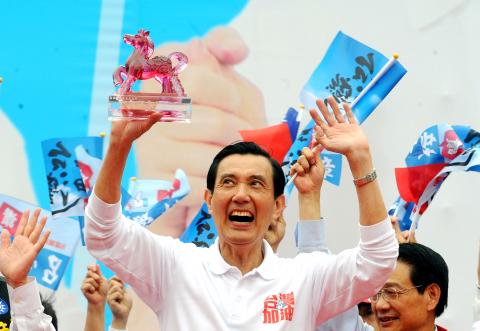The Democratic Progressive Party (DPP) yesterday accused President Ma Ying-jeou (馬英九) of being “phony” when he said that Beijing does not support his re-election bid.
In an interview with the BBC’s Chinese-language Web site, Ma on Friday said claims about Beijing backing his re-election bid were not accurate.
The remark drew criticism from the DPP yesterday, with DPP spokesman Chen Chi-mai (陳其邁) saying that since Ma was elected in 2008, he has never at any international occasion or cross-strait negotiation formally demanded that China dismantle its missiles targeting Taiwan.

Photo: CNA
Ma was only thinking of how to win re-election and was not putting the safety of Taiwan first despite China’s missiles posing a national security threat to Taiwan, he said.
“When Ma was running for president in 2008, he included demands for the Chinese to dismantle the missiles, but then the demands disappeared,” Chen said, adding that “Ma’s phoniness could also be seen in his proposal of cross-strait peace accords, in which he made no mention of his previous remarks that called on Beijing to remove its missiles aimed at Taiwan [as a precondition for negotiations on a cross-strait peace treaty].”
In the BBC interview, Ma said the allegations that Beijing backs his re-election were made up by his rivals and that none of them were able to present evidence to back their claims.
In the interview, Ma renewed his call for Beijing to dismantle ballistic missiles targeted at Taiwan as early as possible, saying that Beijing’s missile deployment was detrimental to the development of relations across the Taiwan Strait. The missile deployment is also one of the main reasons behind the aversion of Taiwanese to the Beijing government, he said.
Responding to a question on whether he could talk Beijing into removing missiles targeted at Taiwan if he were re-elected, Ma said Beijing should be fully aware of the feelings of Taiwan’s people.
“I see no need to negotiate this issue. It should take the initiative to do that,” Ma said.
He asked: “Is Beijing kind to me, when it has missiles targeting me?”
In an interview with the BBC on Thursday, DPP presidential candidate Tsai Ing-wen (蔡英文) said she was open to the possibility of visiting China as long as Beijing did not set any unreasonable conditions.
In contrast, Ma said that if re-elected, he would not visit China to meet with its top leader. Asked about his views on China’s up-and-coming leaders, such as Chinese Vice President Xi Jinping (習近平) and Chinese Vice Premier Li Keqiang (李克強), Ma said he has some knowledge of them, but added that no matter how the composition of Beijing’s government changed, its new leaders would support the basic framework for peaceful cross-strait development.
Ma also denied that Tsai had moved past him in the polls as the DPP has claimed in recent days. He said internal KMT polls had him steadily rising, and he expressed complete confidence that he would emerge victorious in the Jan. 14 election.
Translated by Jake Chung, Staff Writer

MAKING WAVES: China’s maritime militia could become a nontraditional threat in war, clogging up shipping lanes to prevent US or Japanese intervention, a report said About 1,900 Chinese ships flying flags of convenience and fishing vessels that participated in China’s military exercises around Taiwan last month and in January have been listed for monitoring, Coast Guard Administration (CGA) Deputy Director-General Hsieh Ching-chin (謝慶欽) said yesterday. Following amendments to the Commercial Port Act (商港法) and the Law of Ships (船舶法) last month, the CGA can designate possible berthing areas or deny ports of call for vessels suspected of loitering around areas where undersea cables can be accessed, Oceans Affairs Council Minister Kuan Bi-ling (管碧玲) said. The list of suspected ships, originally 300, had risen to about 1,900 as

Japan’s strategic alliance with the US would collapse if Tokyo were to turn away from a conflict in Taiwan, Japanese Prime Minister Sanae Takaichi said yesterday, but distanced herself from previous comments that suggested a possible military response in such an event. Takaichi expressed her latest views on a nationally broadcast TV program late on Monday, where an opposition party leader criticized her for igniting tensions with China with the earlier remarks. Ties between Japan and China have sunk to the worst level in years after Takaichi said in November that a hypothetical Chinese attack on Taiwan could bring about a Japanese

MORE RESPONSIBILITY: Draftees would be expected to fight alongside professional soldiers, likely requiring the transformation of some training brigades into combat units The armed forces are to start incorporating new conscripts into combined arms brigades this year to enhance combat readiness, the Executive Yuan’s latest policy report said. The new policy would affect Taiwanese men entering the military for their compulsory service, which was extended to one year under reforms by then-president Tsai Ing-wen (蔡英文) in 2022. The conscripts would be trained to operate machine guns, uncrewed aerial vehicles, anti-tank guided missile launchers and Stinger air defense systems, the report said, adding that the basic training would be lengthened to eight weeks. After basic training, conscripts would be sorted into infantry battalions that would take

DEEP-STRIKE CAPABILITY: The scenario simulated a PLA drill that turned into an assault on Taiwan’s critical infrastructure, with the launchers providing fire support Taiwan yesterday conducted this year’s first military exercises at Longsiang Base in Taichung, demonstrating the newly acquired High Mobility Artillery Rocket System’s (HIMARS) ability to provide fire support and deep-strike capabilities. The scenario simulated an attack on Penghu County, with HIMARS trucks immediately rolling into designated launch areas and firing barrages at the Wangan (望安) and Cimei (七美) islands, simulating the provision of fire support against invading forces. The HIMARS are supposed to “fire and leave,” which would significantly increase personnel and equipment survivability, a military official said. The drill simulated an exercise launched by the Chinese People’s Liberation Army (PLA) Eastern